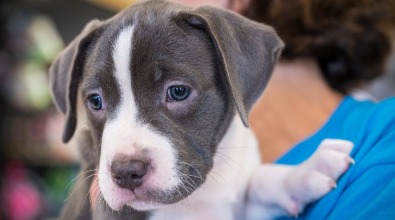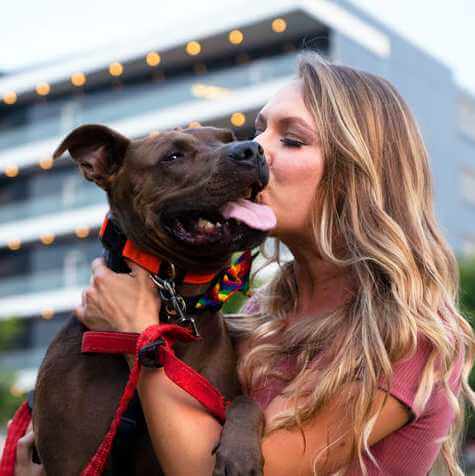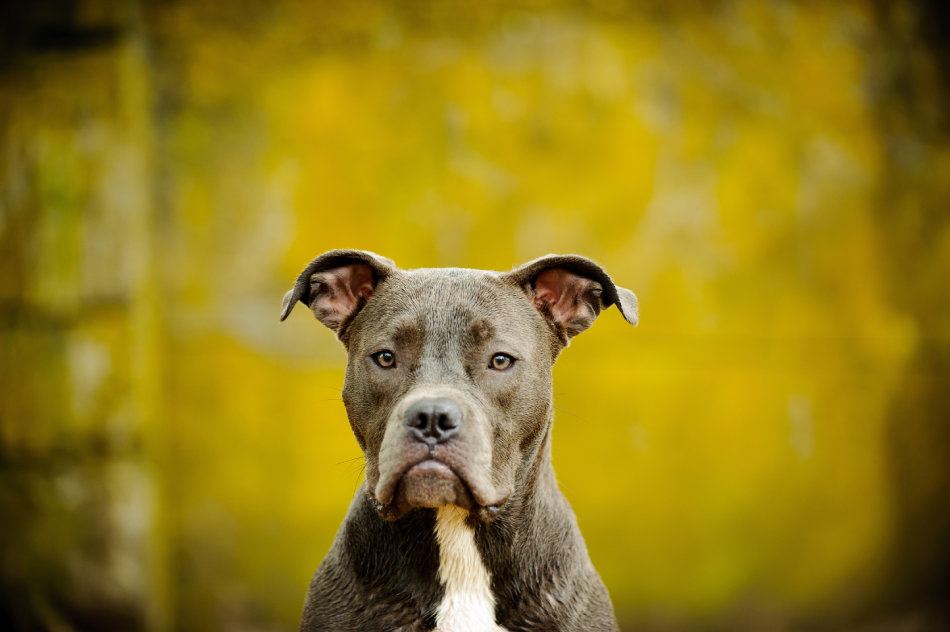
In this post:
- Are pit bull-type dogs more aggressive than other dogs?
- Do pit bull-type dogs have locking jaw?
- Are pit bulls bred to fight?
- Are bully breeds more dominant?
There are certain physical and behavioral traits that characterize each dog breed. Every dog was initially bred to perform a specific job, like hunting rabbits, herding livestock, or sitting quietly on someone’s lap. When developing a breed, breeders selected only those dogs that performed their job best to pass those traits on to the next generation.
However, while a dog’s genetics may be why they perform certain behaviors, huge variations exist among individual dogs of the same breed. Additionally, some dogs are now bred for entirely different jobs than those they were originally meant. Golden retrievers were bred for hunting ducks, and are now primarily bred as service dogs!

The pit bulls we know today are descendants of English bull-baiting dogs. However, when they outlawed baiting large animals in the 1800s, breeders decided to start pitting their dogs against each other in fights. Other pit bulls were specifically bred for work and companionship. These dogs have always been popular, loyal family pets. They are noted for their gentleness, earning the nickname “nanny dogs.” And even those pit bulls bred to fight other animals were not prone to aggressiveness toward people.
So why do pit bulls have such a terrible reputation today?
There is a lot of negative, incorrect press out in the world about these dogs.
In this article, we dispel the myths and rumors about this lovely breed!
Are pit bull-type dogs more aggressive than other dogs?
According to a study done by the Animal Temperament Test Society, dogs categorized as “pitbull-type” achieve excellent temperament scores. In fact, pit bulls scored in the top 23% of all breeds tested! Furthermore, several other peer-reviewed studies concluded that a dog’s breed has no determination on its aggressiveness or danger. Because of their excellent temperament, pit bulls have become increasingly popular dogs.
Early positive experiences and socialization are vital in preventing aggressive tendencies in dogs. Any puppy with the opportunity to learn how to interact, play, and communicate with humans and other dogs are less likely to show aggressive behavior as an adult.
Given the powerful impact of socialization, it’s no surprise that dogs who are chained outside and given no positive human interaction are more likely to bite people than dogs who have been integrated into our homes.
Are pit bulls bred to fight?
One of the biggest myths about pit bulls is that they are all bred to fight. This is entirely untrue. As we stated earlier in the article, just because a breed of dogs has been used for one task does not mean that all individuals of that breed will perform that task.
When deciding whether a dog is going to be aggressive, go back to the environment and humans in the dog’s history. That will tell you the most about how a dog will behave in social situations. If the dog has been abused and not appropriately socialized, it will be more uneasy around other dogs and strangers. However, if the dog has a positive history with people and received decent training, then there is no reason why it should be considered dangerous.
Are bully breeds more dominant?
Like most breeds, the dominant behavior has been bred out of pit bulls and other bully breeds. While pit bulls get a bad rap, they are no more dangerous than other dogs. Read here about how to attack statistics for pit bulls are affected due to their sheer number in the united states. Like most dogs, pit bull’s aggressive behavior does not stem from dominance but from fear or anxiety. So helping your dog deal with those issues should help eliminate the unwanted aggressive behavior.
The term “pit bull” is commonly used by the media as a blanket term to report dog bite-related incidents when the breed is not fully known, when the breed is mixed, or when the dog is misidentified due to inaccurate visual identification methods. Furthermore, the vast majority of media reports on bite-related incidents describe situations that confirm what a recent peer-reviewed study concluded – that factors associated with irresponsible ownership (and not the dog’s breed) were the primary cause of the incident.
As with any breed, irresponsible ownership is a precursor to increased risk with energetic dogs. It is up to us as owners to ensure that we are being responsible and providing our pets with the training and care they need!
Special thanks to:

Drayton Michaels, CTC
Drayton Michaels, CTC is the owner of Urban Dawgs Dog Training in Red Banks, NJ. He also holds a Certification in Dog Training and Behavior Counseling from the San Francisco SPCA Academy for Dog Trainers.

Dr. James C. Ha, Ph.D., CAAB
Dr. James C. Ha, Ph.D., CAAB is a professor of applied animal behavior at the University of WA and a certified applied animal behaviorist with over 30 years of experience in animal behavior teaching, research, consulting, and expert witness services. Aly was privileged enough to be in his Applied Animal Behavior Certification program.





